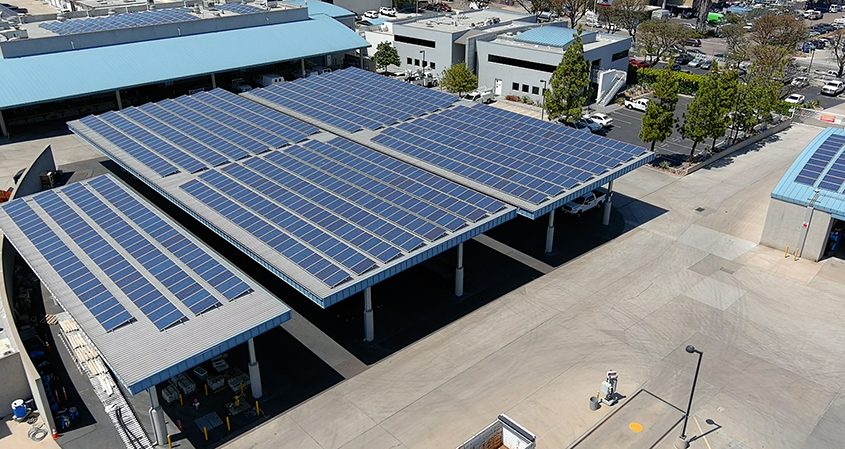Helix Water District received recognition from The Climate Registry as a Water-Energy Leader Gold organization after the district reduced its electric use by 15% and greenhouse gas emissions by 40%.
The Climate Registry is a nonprofit organization that helps companies, governments, and institutions reduce their emissions. Its Water-Energy Nexus Registry is sponsored by the California Environmental Protection Agency and allows utilities and cities to measure, track, and mitigate greenhouse gas emissions associated with California’s water system.
The University of San Diego Energy Policy Initiative Center, or EPIC, confirmed the district’s 2019 and 2021 total greenhouse gas emissions are 40% lower than those in 2009. EPIC’s findings were verified by a third party. The Climate Registry made the announcement this month based on this verification.

Solar panels atop the Helix Water District Operations Center in El Cajon help reduce energy consumption and greenhouse gas emissions. Photo: Helix Water District
“This award is a testament to the fact you can be a good steward of the environment while also making sound financial decisions,” said Helix Board President Kathleen Coates Hedberg. “We found that energy efficiency is very similar to water conservation. You take advantage of every opportunity to save a little bit because there isn’t one thing that will get you to the finish line. But together they have an impact.”
Retrofits, upgrades, and sustainability savings add up

Helix Water District Board of Directors in the district’s new all-electric, zero-emission, Ford F-150 Lightning pickup truck in 2022. Driver’s seat: Board President Kathleen Coates Hedberg. Backseat: Director Dan McMillan. Back of the truck: Directors Joel Scalzitti, De Ana Verbeke and Mark Gracyk. Photo: Helix Water District
Helix achieved its most recent emission reductions through multiple efforts, including a comprehensive lighting retrofit program, new lighting management system, and an upgrade to the HVAC system at the district’s R.M. Levy Water Treatment Plant.
Helix also transitioned its diesel fleet to 100% renewable diesel fuel.
Previously, the district installed solar panels at its operations center, initiated load shifting at its Levy Water Treatment Plant and pump stations to off-peak periods, and obtaining grants to install electric vehicle charging stations at its facilities.
In 2021, the San Diego County Water Authority earned Climate Registered gold status from The Climate Registry for verifying and publicly reporting its greenhouse gas emissions.
(Editor’s note: The Helix Water District is one of the San Diego County Water Authority’s 24 member agencies that deliver water across the San Diego County region.)








